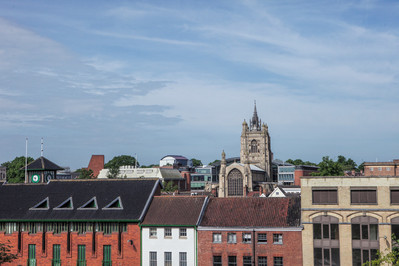It needs ‘sparkle’
How local community policy making can succeed

25 February 2022
by Dr Jurgen Grotz
Director - Institute of Volunteering Research
On Monday 21 February 2022, as the director of the Institute for Volunteering Research (IVR) it was my privilege to co-host a webinar with Harris Tiddens, from Mehr Demokratie e. V. (More Democracy) a registered German association supporting direct citizen participation in democracy.
Chaired by Baroness Scott, a three nation panel of six colleagues from Germany: Dr. Phil. Habil. Hilke Rebenstorf and Andrea Isermann-Kühn; from Holland: Frank Brander and Thijs van Mierlo; and from the UK: Sam Moon (Norwich City Council: Community Enabling Team) and Dr Ben Little (University of East Anglia) discussed whether people who come together where they live, can build and maintain sustainable, resilient neighbourhoods and small towns and what could be the ‘sparkle’ that makes it happen.
Why is this important?
From climate change to divisive political discourse, from socio economic impact of the COVID-19 Pandemic to social isolation, we face a range of major crises, each with the potential to greatly damage our local communities. Can people, coming together where they live, respond to those challenges to build and maintain sustainable and resilient communities, and what, if any is the role of government?
Three questions for different situations
One of the panellists, Sam Moon, suggested that there are different questions we might consider:
- What are residents in communities best placed to do together?
- What can residents best do with some outside help?
- What do communities need outside institutions to do for them?
Three ways of organising
In the first instance, government should probably be prepared to get out of the way and Thijs van Mierlo gave the example of new legislation in Holland about this. When it comes to the latter two situations, the panellists described and favoured different types of community development:
- professional organisers can encourage community groups to organise themselves
- professional organisers can organise community groups
- residents and community groups can become part of formal governance structures.
Community groups come in many forms and sizes and Dr Hilke Rebenstorf described areas of overlap, for example, between faith communities and others. Given the many possible challenges that can arise during local democratic involvement the panellists did not favour approaches free from organisation, with Dr Ben Little warning against the 'The Tyranny of Structurelessness'.
However, all panellists agreed that for local democratic participation to succeed, in whatever form, one key ingredient was needed. Frank Brander and Andrea Isermann-Kühn described it as ‘sparkle’ or as a ‘flame’. It is the passion of residents to make their neighbourhood a good place to live.
Summary
Our discussion made clear that volunteering is an essential part of local democratic participation. It might not just build and maintain sustainable and resilient neighbourhoods and small towns, but help to save the planet. But it is neither an easy nor a free option. One panellist suggested that we need more questions rather than more opinions. At the Institute for Volunteering Research, we are experts in asking questions about volunteering and we are now setting out together, to explore afresh the role of volunteering in participation and democracy. To us, this is only the beginning of a conversation. Join us as we continue to critically explore the narratives around volunteering and local democracy.
The panellists were kind enough to record position statements to help us get the conversation started. I find them very powerful, so I encourage you to view them if you are interested in the role of volunteering in participation and democracy.
Let us know what you think by emailing info.ivr@uea.ac.uk
)
)